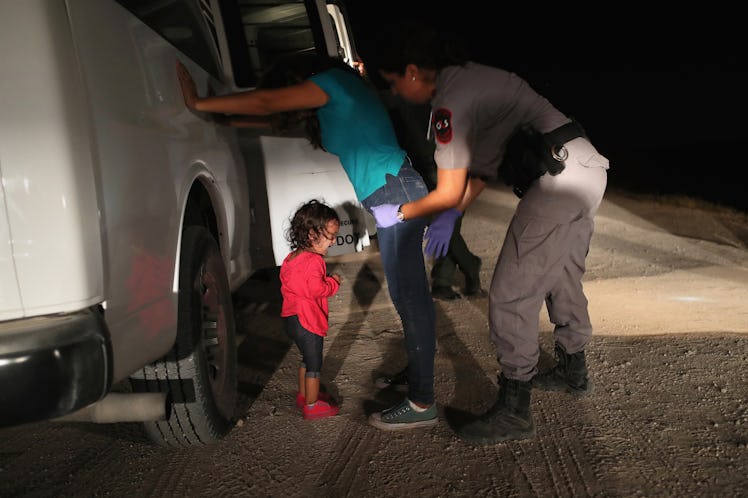
Here's What Happens To Migrants At The Border After They've Been Prosecuted
President Donald Trump's "zero tolerance" immigration policy, which resulted in thousands of children being separated from their parents after migrating across the United States' southern border between April and mid-June, appears to be changing swiftly. After the president signed an executive order with a stated mission to end family separation, both CNN and The Washington Post reported that U.S. Customs and Border Protection offices have stopped referring migrant parents to prosecution. But while those news reports give an indication to how migrants will be treated in the near future, it has seemed unclear what happened to migrants who did get prosecuted.
A new report from USA Today, citing federal court records, details the process those prosecuted migrants go through, describing it as "seldom more than a symbolic undertaking."
The reports says that out of 2,598 judgements since mid-May, nearly 70 percent resulted in migrants pleading guilty and receiving a sentence that amounted to the time they'd already serving before arriving before a judge. That would mean that most migrants end up being held, transported to federal courts, sentenced to no additional penalties (beyond a small fee), and then processed for deportation.
Elite Daily reached out to the Justice Department for comment on the statistics reflected in USA Today's reporting, but did not hear back at the time of publication.
So, because the majority of these cases appear to not result in significant fees nor additional jail time, the separation of children from parents seems to be the most significant consequence faced by migrants crossing the border.
"There is no reason for the government to do this other than to be cruel and send the message that you are not welcome," one federal public defender told USA Today. "The thing that’s just horrible is that they’re using it to take the children."
On Thursday, June 21, Attorney General Jeff Sessions, the head of the Justice Department, spoke about the perception that the Trump administration was taking an unusually cruel position against immigrants.
"I have critics from a lot of different areas. I think our church people are really concerned about children — that's what I'm hearing," Sessions told the Christian Broadcasting Network (CBN). "I feel it. I think there's a legitimate concern there and I'm pleased to work with the president to address those concerns."
Sessions also referred to the president's executive order as the "right thing" to do.
"It hasn’t been good and the American people don’t like the idea that we are separating families," Sessions told CBN. "We never really intended to do that. What we intended to do, was to make sure that adults who bring children into the country are charged with the crime they have committed."
Days earlier, however, Sessions had said family separation should discourage migrants from crossing illegally over the southern border. When pressed by Fox News' Laura Ingraham whether the separation were meant to be a deterrent, he responded,
I see the fact that no one was being prosecuted for this as a factor in a fivefold increase in four years in this kind of illegal immigration. So yes, hopefully people get the message and come through the border at the port of entry and not break across the border.
USA Today's report also detailed how the president's executive order had affected migrants who had been apprehended on the border in the days after.
The president's order was signed on Wednesday. On Thursday, after border agents bused 17 migrants to a federal court in McAllen, Texas, those migrants were "abruptly" returned to a holding facility without being charged, USA Today reports.
In the meantime, though, while the administration shows signs of ending prosecution of illegal migrants, many of the families that already were separated have not been reunited. Given how little penalties migrants face in court, that separation remains the biggest consequence of them all.